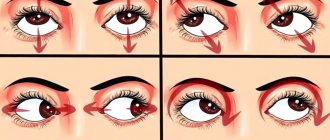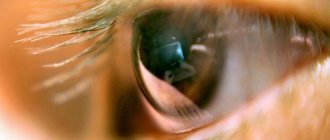Deterioration of vision during pregnancy is a common phenomenon that is associated with changes in hormonal levels. During this period, a woman’s body is subjected to extreme stress, and the visual system is no exception. Let's look at why vision deteriorates in an “interesting” position, as well as after childbirth.
Pregnancy is a special period in a woman’s life that requires a serious and responsible attitude. Already in the first trimester, dramatic changes occur in the body of the expectant mother, including hormonal changes. This affects the performance of all organs, including the visual system. With an increase in the level of progesterone, which is responsible for the safety of the fertilized egg, fluid retention occurs in the tissues, which provokes their swelling and reduces elasticity.
The structure of the eye also undergoes this change, which is why many women note that their vision deteriorates during pregnancy.
Indeed, it may fall by one or two diopters. If the patient previously had farsightedness, myopia or astigmatism, then during pregnancy this pathology often progresses. Therefore, you should pay special attention to your visual organs and undergo a timely examination by an ophthalmologist.
Vision during pregnancy: when should you visit an ophthalmologist?
The question of whether natural childbirth is allowed for various refractive errors is often discussed on forums. It should be noted that the indication for a cesarean section is the critical condition of the expectant mother’s retina, which can occur with a high degree of myopia, as well as for other reasons. This is due to the fact that the process of giving birth to a child is accompanied by a colossal load on the woman’s body. During this period, the weakened and thinned retina is at maximum risk of rupture and stretching. Under unfavorable circumstances, there may be a severe deterioration in vision after childbirth, up to its complete loss.
To eliminate risks, a woman must undergo her first examination by an ophthalmologist in the first trimester of pregnancy, at 10–14 weeks.
During the visit, the doctor carefully examines the condition of the fundus of the eye, the retina, as well as the degree of refractive error. If the specialist determines that there is a risk of retinal detachment, the patient will be shown a simple and painless procedure to “weld” the retina to the underlying tissue. It lasts about 20 minutes. After this, the expectant mother should be systematically examined by a doctor every month.
Many women are afraid that if their vision has deteriorated during pregnancy, then natural childbirth is prohibited. The indication for a cesarean section is a high degree of myopia (from 6.25 diopters) in the later stages (30–40 weeks). In this case, the procedure to strengthen the retina is already contraindicated. The ophthalmologist provides an opinion on the possibility of natural childbirth during a re-examination at 36 weeks of pregnancy. However, the final decision remains directly with the obstetrician coordinating the birth process.
Visiting an ophthalmologist in the first trimester will allow you to:
- Promptly identify visual impairments;
- If necessary, perform laser coagulation in the early stages;
- Increase the chances of natural childbirth;
- Reduce the risk of retinal rupture and detachment;
- Preserve the health of the eyes of the expectant mother.
Eyes and pregnancy: possible changes
Author Elena Orlova
24.11.2019 17:10
Health » Obstetrics and gynecology
This happens to 15 percent of all pregnant women. Hormonal changes, metabolic changes, fluid retention and circulation can all affect your eyes and vision.
Water retention contributes to a slight increase in corneal thickness and curvature. If your vision changes during pregnancy, it will likely be minor and temporary. Most symptoms will disappear within a few months after giving birth. If you wear glasses, it is unlikely that you will need to change your prescription, but it is possible.
If you think your vision has noticeably deteriorated, contact your ophthalmologist for an examination.
Dryness and irritation
Your eyes may be drier and more irritated during pregnancy (and as long as you're breastfeeding). It can also make wearing contact lenses difficult.
Visual disturbances from migraine
You may also notice flickering or blind spots. One possible cause is migraine with aura, which some women experience for the first time during pregnancy. In this condition, a painful headache (usually on one side of the head) is preceded by an aura. This may include visual disturbances such as bright flashes of light, zigzag lines, blind spots or even temporary vision loss. Aura symptoms are possible without headache.
Eye diseases
Some women with healthy pregnancies develop an eye condition called central serous chorioretinopathy. In this condition, fluid accumulates under the retina. Layers of the retina then tear away and distort vision, creating blind spots.
This condition is related to stress hormones and usually develops late in pregnancy, but can also occur in the first or second trimester. Your vision usually returns to normal towards the end of your pregnancy or a few months after giving birth.
How can you get relief from dry eyes during pregnancy?
Ask your ophthalmologist about safe remedies for dry eyes. Some over-the-counter solutions are suitable for use, while others contain active ingredients that may not be completely safe during pregnancy.
If you are used to wearing contact lenses, try wearing them for shorter periods of time. If this doesn't help, switch to glasses until you give birth.
Take regular breaks if you spend time in front of the TV, computer or smartphone. Staring at a screen for long periods of time without blinking as often as usual can make dryness and irritation worse.
Are vision changes during pregnancy a cause for concern?
Yes, some changes are symptoms of potentially dangerous conditions, such as high blood pressure. About 25 percent of women with severe preeclampsia and 50 percent of women with eclampsia experience visual symptoms, which tend to get worse as the disease worsens. Symptoms include blurred vision, inability to focus, blind spots, double vision, and flashing lights.
You should contact your doctor if you have pain or redness in your eyes, or if you notice swelling around the eyes, also a symptom that may accompany preeclampsia.
Photo preview: prozrenie-nn.ru
Curator: Elena Andreeva
Topics: eyes vision health pregnancy
Is natural childbirth possible after vision correction?
Quite often, expectant mothers wonder whether laser vision correction is acceptable before pregnancy. Some argue that it is better to delay it until postpartum, since this procedure may prohibit natural childbirth. However, experts say that this is not so. Speculation about contraindications arose due to the fact that the method of radial keratotomy (incisions on the cornea) was previously actively used, which had significant limitations regarding physical activity. Currently, vision restoration is carried out using a laser without interfering with the deep structures and layers of the visual organs. Therefore, the procedure does not impose restrictions on physical activity. Thus, vision correction with laser before pregnancy does not affect the course of labor.
Laser correction is not recommended if the woman is already in an “interesting” position or is at the breastfeeding stage. This is due to the fact that due to hormonal changes, there is a certain risk of prolonged healing of the cornea after surgery. Although the procedure does not pose any danger to the child’s health.
What should you know about laser vision correction before giving birth?
- The procedure does not impose restrictions on the natural birth process;
- The operation is prohibited during pregnancy and lactation due to the possible risk of prolonged healing of the cornea;
- The procedure does not pose a risk to the child's health.
Observation by an ophthalmologist
If a woman has developed myopia, even the first degree, she should be periodically examined by an ophthalmologist. The initial reception occurs in several stages:
- Anamnesis collection. This is data obtained from the patient’s words.
- General examination of surface tissues. The doctor can determine inflammatory, infectious diseases, and mechanical damage.
- Assessment of visual acuity. For this purpose, diagnostic tables are used, on which letters are depicted. The more lines the patient examined, the better the visual acuity.
- Fundus examination. The doctor determines the condition of the cornea, lens, vitreous body, retina, and microcirculation vessels. Such a study is performed periodically to assess the functionality of the departments during gestation.
Other diagnostic tests, such as MRI and CT, are not performed. This is due to the fact that the body of a pregnant woman should not be affected by radiation. This will harm the fetus. The doctor monitors the patient’s treatment over time. If the condition of the internal structure of the eye gradually worsens, this is a direct indication for a cesarean section.
Vision deteriorated during pregnancy: what to do?
Ophthalmologists say that in an “interesting” position, a woman can use familiar optical products: glasses or contact correction devices. Many expectant mothers prefer lenses because they are much more convenient and practical for everyday use: they fully maintain freedom of movement and do not squeeze the bridge of the nose. In addition, these products provide high clarity not only in central but also in lateral vision.
It is worth noting that there are no contraindications to the use of lenses during pregnancy. However, before purchasing optical products, you should definitely undergo an examination with an ophthalmologist and find out whether it is possible to wear lenses in your particular case.
Pros of wearing lenses during pregnancy:
- Full freedom of movement;
- High quality vision;
- Possibility of use in any weather (they do not fog up in rain and fog);
- Any experiments with style (lenses do not change appearance).
Many experts say that you can wear soft lenses until any stage of pregnancy. In addition, it is even allowed to give birth in them, having warned the obstetrician about this in advance. The exception is the birth process using cesarean section.
In the production of modern optical products, silicone and silicone hydrogel materials with high oxygen permeability and moisture content are used. They allow the eyes to “breathe” and provide maximum wearing comfort. During pregnancy, ophthalmologists recommend using daily lenses. They are considered the safest because they are disposed of immediately after the first wear. Thanks to this, various deposits and contaminants do not have time to accumulate on their surface.
Despite the fact that lenses and pregnancy are compatible, a woman should pay special attention to following the rules of their use and maintaining hygiene.
Features of wearing lenses in an “interesting” position:
- If possible, wear one-day clothes (they are more practical and safe);
- Follow the wearing schedule and cleaning schedule when using scheduled replacement models (from 2 weeks);
- Pay special attention to maintaining visual hygiene;
- If you feel tired and irritated in your eyes while wearing optical products, and changing the manufacturer and model does not help,
- It is recommended to temporarily stop using them.
Vision correction for a pregnant woman
Any change in visual acuity must be corrected. During pregnancy, only 2 correction methods can be used:
- wearing glasses;
- use of contact lenses.
If the cause of vision loss is any disease, then it is necessary to treat the underlying pathological process.
The preferred method of correction is the use of glasses. Glasses must be selected by an ophthalmologist on an individual basis.
It is better to use contact lenses during the day. According to the wearing regime, preference is given to lenses with daily or frequent scheduled replacement (use period up to 2 weeks). When using contact lenses, it is important to follow the rules for storing and wearing them.
If during pregnancy a woman notices that she has difficulty seeing, then she needs to visit an ophthalmologist to get a new prescription for glasses or contacts.
Will vision be restored after childbirth?
The possibility of restoring vision after childbirth depends on the reason that caused its deterioration, as well as on the degree of changes that have already appeared in the eye.
If the decrease in visus occurred as a result of stretching of the membranes of the eye, then its recovery after childbirth will not occur. In addition, a rapid increase in the size of the eyeball can lead to the appearance of pathological changes in the periphery of the retina. Therefore, within 6 months after birth, it is advisable to undergo an examination by an ophthalmologist.
Visual impairment associated with general diseases usually goes away after childbirth. The recovery process may take some time, so medical supervision is necessary.
Symptoms of preeclampsia or eclampsia usually go away within a few days after birth. But if, against the background of gestosis, thrombosis of the retinal vessels occurs, then the deterioration of the condition is permanent. After delivery, you need to continue intensive treatment of post-thrombotic retinopathy by an ophthalmologist.
Preventing visual impairment during pregnancy
Preventive measures to preserve visual acuity include:
- compliance with the visual regime;
- rejection of bad habits;
- early detection and treatment of extragenital pathology that affects the condition of the eyes;
- correctly selected correction in the presence of refractive errors.
Yulia Chernova, ophthalmologist, especially for Mirmam.pro
Can vision deteriorate after childbirth?
A difficult birth with complications from pushing, large blood loss and increased blood pressure can lead to decreased clarity of vision. Women who have various refractive errors are most susceptible to this. Ophthalmologists say that many patients experience a slight physiological decrease in visual acuity after childbirth, usually no more than 1 diopter. This is a temporary phenomenon that goes away on its own. Often, a woman’s vision returns to normal after some time, when hormonal levels are restored.
However, it should be taken into account that vision after childbirth may deteriorate due to other factors. This is often due to the woman spending a long time in a confined space during the first months of the baby’s life. Due to the short distance to objects, the eye has no place to “train”, so vision is slightly reduced. To prevent this during the postpartum period, it is useful to walk more often in open space and do visual exercises.
The exercises will take a little of your time, only 5-10 minutes a day, but will help preserve your vision.
Effective eye exercises during the postpartum period:
- Find two points in the room (one close and the other as far away as possible). Alternately focus your attention on them. This exercise should be repeated about 10-15 times.
- Cover your eyes with your palms without lowering your eyelids, and then open them. Repeat 10 times. This helps to train all the muscles of the eyeball due to the sudden change in light.
- Figuratively “write” with your eyes the numbers from one to nine.
- Close your eyes 10-15 times, for example, during breastfeeding.
Effect on pregnancy
The risk group for visual impairment during pregnancy includes women with preeclampsia. At this time, toxicosis develops in the later stages, increasing intraocular and blood pressure. These processes contribute to impaired blood flow in the eye area, degeneration of the retina and optic nerve.
Women at risk should be periodically examined by an ophthalmologist. The definitive diagnostic test is fundus examination. The doctor periodically evaluates the condition of the retina and microcirculation vessels. If a significant or severe deviation is detected, the ophthalmologist will recommend a cesarean section.
After childbirth, vision decreased during lactation: can this happen?
Among expectant mothers, there is an opinion that breastfeeding contributes to a decrease in visual acuity, as well as aggravation of problems with myopia or farsightedness. Experts deny this fact. Indeed, after childbirth, a physiological decrease in visual acuity may be observed, but this is due solely to changes in hormonal levels in the body, and not to the production of breast milk.
Thus, during lactation the pathology may worsen, but, as a rule, this is a temporary phenomenon that disappears when breastfeeding ends.
Ophthalmologists advise using correction products during this period to get rid of discomfort and enjoy the clearest vision possible.
We recommend that you familiarize yourself with the wide selection of contact lenses from world brands on the Ochkov.Net website. We offer high quality products that are popular all over the world. We guarantee you ease of ordering and the fastest possible delivery throughout Russia!











